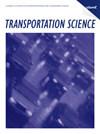A Bilevel Model for Robust Network Design and Biomass Pricing Under Farmers’ Risk Attitudes and Supply Uncertainty
IF 4.8
2区 工程技术
Q1 OPERATIONS RESEARCH & MANAGEMENT SCIENCE
引用次数: 0
Abstract
This paper addresses an integrated biomass pricing and logistics network design problem. A bilevel design and pricing model is proposed to capture the dynamic decision process between a biofuel producer as a Stackelberg leader and farmers as Stackelberg followers. The bilevel optimization model is transformed into a tractable single-level formulation by using optimality constraints. Other unique characteristics of our problem at hand include the incorporation of the harvesting time and frequency decisions in the biomass supply chain network design problem for the first time and consideration of the uncertainty in switchgrass yield in a robust optimization setting to take into account the risk-averse behavior of the farmers (suppliers). To efficiently solve the model, we propose a Benders decomposition algorithm enhanced by surrogate constraints, strengthened Benders cuts, and in-out cut loop stabilization. The numerical experiments show that the proposed algorithm is significantly superior to the branch-and-cut approach of CPLEX in terms of run times and gaps. We conduct a case study with data from Texas to validate the capabilities of our mathematical model and solution approach. Based on extensive experiments, the benefits of modeling are analyzed, and significant insights are explored. Funding: This research was partially supported by the National Natural Science Foundation of China [Grants 71771135, 72171129]; and the scholarship from China Scholarship Council (CSC) [Grant CSC 201906210092]. Supplemental Material: The online appendix is available at https://doi.org/10.1287/trsc.2021.0357 .农民风险态度和供应不确定性下稳健网络设计和生物质定价的双层模型
本文提出了一个综合生物质定价和物流网络设计问题。提出了一个双层设计和定价模型,以捕捉作为Stackelberg领导者的生物燃料生产商和作为Stackel伯格追随者的农民之间的动态决策过程。利用最优性约束将双层优化模型转化为可处理的单层公式。我们手头问题的其他独特特征包括首次将收获时间和频率决策纳入生物质供应链网络设计问题,并在稳健的优化设置中考虑柳枝稷产量的不确定性,以考虑农民(供应商)的风险规避行为。为了有效地求解该模型,我们提出了一种Benders分解算法,该算法通过代理约束、增强Benders割和内外环稳定来增强。数值实验表明,该算法在运行时间和间隙方面明显优于CPLEX的分支和切割方法。我们用德克萨斯州的数据进行了一个案例研究,以验证我们的数学模型和解决方案的能力。在大量实验的基础上,分析了建模的好处,并探索了重要的见解。基金资助:本研究得到国家自然科学基金部分资助【7177113572171129】;以及国家留学基金委员会(CSC)的奖学金【CSC 201906210092】。补充材料:在线附录可在https://doi.org/10.1287/trsc.2021.0357。
本文章由计算机程序翻译,如有差异,请以英文原文为准。
求助全文
约1分钟内获得全文
求助全文
来源期刊

Transportation Science
工程技术-运筹学与管理科学
CiteScore
8.30
自引率
10.90%
发文量
111
审稿时长
12 months
期刊介绍:
Transportation Science, published quarterly by INFORMS, is the flagship journal of the Transportation Science and Logistics Society of INFORMS. As the foremost scientific journal in the cross-disciplinary operational research field of transportation analysis, Transportation Science publishes high-quality original contributions and surveys on phenomena associated with all modes of transportation, present and prospective, including mainly all levels of planning, design, economic, operational, and social aspects. Transportation Science focuses primarily on fundamental theories, coupled with observational and experimental studies of transportation and logistics phenomena and processes, mathematical models, advanced methodologies and novel applications in transportation and logistics systems analysis, planning and design. The journal covers a broad range of topics that include vehicular and human traffic flow theories, models and their application to traffic operations and management, strategic, tactical, and operational planning of transportation and logistics systems; performance analysis methods and system design and optimization; theories and analysis methods for network and spatial activity interaction, equilibrium and dynamics; economics of transportation system supply and evaluation; methodologies for analysis of transportation user behavior and the demand for transportation and logistics services.
Transportation Science is international in scope, with editors from nations around the globe. The editorial board reflects the diverse interdisciplinary interests of the transportation science and logistics community, with members that hold primary affiliations in engineering (civil, industrial, and aeronautical), physics, economics, applied mathematics, and business.
 求助内容:
求助内容: 应助结果提醒方式:
应助结果提醒方式:


